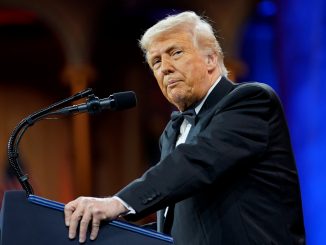Donald Trump Delivers Powerful Message on Global Shipping and Minimum Tax Policy

In a recent public statement, former President Donald Trump delivered a forceful message aimed at the world’s largest shipping nations, calling for a sweeping reform in international tax policy. Trump proposed the introduction of a minimum tax of $100 per shipment, targeting foreign shipping conglomerates that, according to him, have long benefited from favorable trade routes and minimal oversight while exploiting American infrastructure and ports.
Speaking from a campaign-style rally, Trump emphasized the need to restore fairness and sovereignty in global trade. “For decades, massive shipping nations like China, Singapore, and others have used our ports, our roads, and our security—without paying their fair share,” he said. “It’s time to level the playing field. We will impose a minimum $100 tax on all foreign shipments entering the United States. No exceptions.”
This proposed policy, Trump argued, would protect American businesses from unfair global competition and generate billions in new revenue. He also framed the tax as a national security and economic independence measure, suggesting it would help bring critical industries and jobs back to the United States.
While the exact mechanics of the tax weren’t fully detailed, Trump mentioned that it would apply to commercial shipping vessels and cargo containers coming from what he described as “trade superpowers.” He called out specific countries by name, including China, South Korea, and Germany, accusing them of “profiting off the American consumer” while failing to reciprocate in trade balance or infrastructure investment.
“This is not isolationism. This is about respect. If you want to use American ports, if you want to sell to American citizens, you’re going to contribute to the American economy,” Trump declared, drawing applause from the crowd.
Critics have already raised concerns that such a tax could trigger retaliatory tariffs and increase the cost of goods for U.S. consumers, potentially leading to a new wave of global trade tensions. Economists warn that global supply chains are delicate, and added costs could ripple through industries from electronics to food distribution.
Nonetheless, Trump’s message has struck a chord with his political base, especially among workers in manufacturing and shipping sectors who feel left behind by globalization. He framed the issue not just in economic terms, but as a fight for national dignity. “We will no longer be the world’s piggy bank,” he said. “America first means American ports, American workers, and American rules.”
Whether this bold proposal will gain traction in Congress remains to be seen, but it marks a significant reentry of Trump into global economic discourse as he positions himself for a potential political comeback. With his sights clearly set on foreign competitors and international policy reform, Trump is once again challenging the status quo—one container at a time.


Be the first to comment